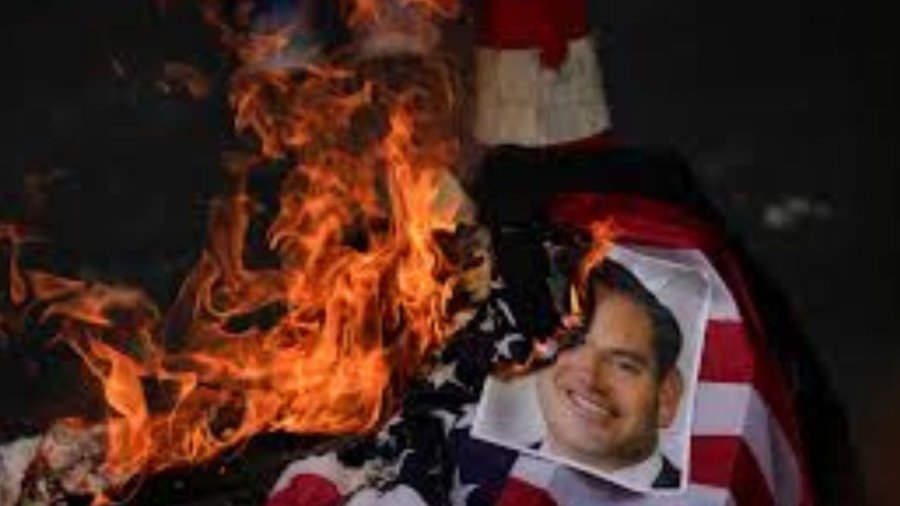Publisher: Bouncer New | Author: Abdul Jabbar
Secretary of State Marco Rubio is going to embark on his first foreign travel this weekend as he heads for Central America with two themes firmly topping his agenda, including curbing illegal immigration and reasserting control for the United States at the Panama Canal, an action that has already drawn criticism from the region.
This was Central America for Rubio, which deviates from the norm set by previous U.S. secretaries of state when they opted to visit Europe or Asia first. It also represents a combination of personal affinity toward the region-the first Hispanic ever to serve in this position-and the strategy by the Trump administration to place the highest foreign policy priorities within the Western Hemisphere.
“It’s no coincidence that my first trip abroad as secretary of state will be within the hemisphere,” Rubio wrote in an op-ed published in The Wall Street Journal on Friday.
Among his agenda, mass migration and drug trafficking will take center stage for Rubio. Still, the visit also aims to challenge China’s growing presence in Latin America, especially with regard to infrastructure spending in areas surrounding the Panama Canal. The U.S. built the canal but relinquished it to Panama in 1999. Even with intense objections from Panamanian leaders, the Trump administration has been very vocal about retaking control of the critical trade artery.
Mass migration, drug smuggling, and the policies of nations such as Cuba, Nicaragua, and Venezuela have created instability, Rubio wrote in his Journal piece. “At the same time, the Chinese Communist Party is using economic and diplomatic influence—especially at the Panama Canal—to undermine U.S. interests and turn sovereign nations into dependent states.”
His first destination on his five-nation tour is Panama, where President José Raúl Mulino has categorically rejected any idea of returning control of the canal to the United States. He says the discussions will be about issues of mutual concern, like migration and drug trafficking.
“The canal is Panamanian. There is no room for negotiation on this matter,” Mulino said on Thursday.
But on this, Rubio is undeterred. Speaking with SiriusXM’s Megyn Kelly, he reiterated that President Trump believes it’s a national security issue because of the increasing Chinese presence in the region. “The president has made it clear that he wants to oversee the canal once again. While the Panamanians are opposed, that stance won’t change our concerns,” Rubio said.
China’s influence over key port facilities at both ends of the canal has been a cause for concern in Washington because if Beijing were to decide to disrupt trade flows, then this would clearly breach the treaty signed in 1977 under which former President Jimmy Carter had agreed to hand over the Panama Canal.
Despite Mulino’s tough talk, analysts see potential for a settlement, at least regarding Hong Kong-based Hutchison Ports, to which was extended a 25-year concession on a no-bid basis. An audit on the legality of that extension has been ordered; rebidding then might let the concession fall to an American or European operator, but that likely would not fulfill Trump’s general demands.
Trump is applying pressure where there may already be an opening,” said Ryan Berg, director of the Americas Program at the Center for Strategic and International Studies in Washington, D.C. “The real question is whether his administration is willing to accept a middle-ground solution or if full control is the ultimate goal.
He is scheduled to visit El Salvador, Costa Rica, Guatemala and the Dominican Republic following Panama as part of the trip. During his visit coincides with resumed U.S. visa processing, after a four-week suspension following a temporary blockade imposed by Colombia over the unwillingness of their government to allow deportation of national back to U.S. end.
Unlike previous secretaries of state who often travel with aid commitments and cooperation initiatives, Rubio’s trip is expected to feature limited new assistance. This is because of Trump’s freeze on foreign aid pending a review of all U.S. assistance programs. Although some critical humanitarian programs have been exempted, waivers for aid packages in Panama, Costa Rica, and the Dominican Republic are still under evaluation.
One notable exception is Haiti, where the State Department has already approved $41 million to support an international peacekeeping mission. Although Rubio will not be visiting Haiti, his discussions with regional leaders are expected to touch on broader U.S. efforts to maintain stability in the region.
Immigration, security, and geopolitical influence are all at stake in Rubio’s tour, which is a critical test for the Trump administration’s foreign policy in Latin America. The results of his negotiations, especially on the Panama Canal, will shape U.S.-Central America relations for years to come.

